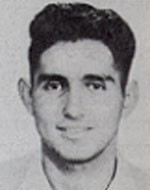Avraham-David (Dov), son of Nati and Shmuel-Shlomo (Sam), was born on April 12, 1939 in Bussburg, South Africa, and immigrated to Israel in 1958. He attended primary and secondary school In his hometown, and at the University of Wuttwatersrand – Hebrew, philosophy, English, sociology and anthropology. David was an outstanding student, especially in the fields of mathematics and history. His desire for studies was intense, and he wanted to know more and understand in different areas. For whatever he thought he had devoted many days to deepening. David was one of the Bnei Akiva youth movement members in South Africa and eventually became one of its leaders and spokespersons and the movement’s center in Johannesburg. He initiated the “weekly shiur” program for each trainee and formulated the idea of establishing the Bnei Akiva Yeshiva. At this yeshiva, which has four students, hundreds of Torah scholars are studying today. David was a God-fearing Jew, proud of his Jewishness, who wanted to bring people closer to the faith of Israel and to the Torah of Israel in pleasant ways, without forcing his opinion. In conversation and action, he wanted to prove to all that there is no difficulty in being a believing Jew and sticking to the laws of the Torah, with every tag. On the contrary, this way of life, which emphasizes the love of people and the love of peace, gives happiness to those who hold it. David was a true man, honest and honest. His friend wrote that he was “so moral that it was hard for him to accept the fact that not everyone behaves honestly and morally.” He would love a man, his ear attentive to all, and it was more appropriate to hear than to play. He did little to tell about himself and did not reveal his inner world, as if he did not want to burden others with the burden of his personal problems. He was kind and even in his youth he would distribute the pocket money he had received from his parents among his poor black people. His willingness to help others and to help him in good spirits was a good thing among his friends. Public affairs and individual affairs were at the top of his mind, and he gave them much of his strength and energy. Each person sought to see the points of light and the charge in it. Never has a man dealt with a duty, not a cent or a scourge, and a distance from the language of evil and gossip. He had patience and tolerance. He was pleasant-looking and hard to be angry, peace-loving and forgiving. He was a man of compromise and knew how to bridge opposing views. He wanted to convince his friends, but not to impose his opinion. Only with himself could he not compromise; again and again he would deepen his analysis. He always wanted to be a model of his behavior. He was humble, modest and humble, did not pursue luxury, and he did not consider material values. David was a pleasant, conversational man. His friends loved him very much and respected him greatly. He had an excellent sense of humor, and he excelled in language refinements, in composing amusing rhymes and in clowning and copying. David was orderly, punctual, agile, organized and methodical in his work. David was drafted into the IDF at the end of June 1960, and volunteered for the Nahal Brigade as part of a nucleus in a group of branches. He was a good soldier, responsible and dedicated to his job, and everything he was entrusted with was faithfully fulfilled. His comrades in the unit loved him very much. His commander tells of him: “His cheerful mood, his wonderful optimism, and above all his laughter, gave a good and relaxed atmosphere to all of us.” He was awarded the Operational Service Award for his part in operational activities. In 1961 he married his girlfriend Esther. After being discharged from regular army service, he continued his studies at the Kerem B’Yavneh Yeshiva and at the Hebrew University of Jerusalem in Sociology and Education for BA and MA degrees. Despite the difficult living conditions during his studies at the Kerem B’Yavneh Yeshiva, he reached the heights of praise he had received from his teachers: “He was sharp and clever.” At the Hebrew University he served as a teaching assistant in the Department of Sociology and participated in the editing of two studies. A few weeks before the outbreak of the Yom Kippur War, he submitted a draft of his doctoral dissertation on Expectations, Reality and Adaptation of Immigrants. When the Yom Kippur War broke out, David was at the Ketuba outpost in Sinai, south of Port Said. On October 7, 1973, an Egyptian tank shell hit David’s position and critically wounded him, and the paramedics’ efforts to save him failed and he died of his wounds, with his lips chanting “Shema Yisrael.” After his death, he was promoted to the rank of corporal, and in a letter of condolence to the bereaved family, his commander wrote: “Despite the onslaught of better enemy forces, David fought with great courage, exposed his body to the fire, and continued to fight from his position, while reporting to his commander until he was injured.” His family published a book in his memory called “Jew, Man and Sociologist,” which contains things about his character, memoirs, letters and photographs; The Hebrew University of Jerusalem published a book in memory of its graduates who fell in the war, and David among them.
